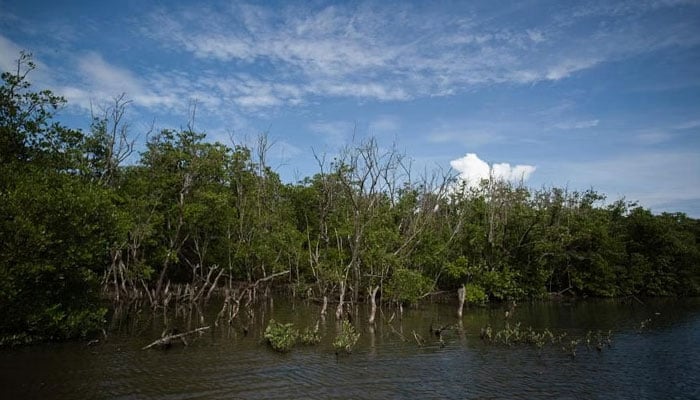Call for adopting transparency in mangrove forest restoration projects
Pakistan should adopt maximum openness, transparency, accountability and local community participation in its drive to regrow mangrove forests on its coastal belt in collaboration with international partners to secure the maximum advantage of the carbon credits it earns through the reforestation drive for the good of national economy and the uplift of the deprived coastal communities.
This was one of the demands put forth by speakers at a seminar, titled ‘Carbon Footprints, Carbon Credits and Mangrove Conservation: Opportunities and Challenges’, organised by the Irtiqa Institute of Social Sciences (IISS).
In his keynote speech, IISS executive committee member and financial market expert Kamran Abbas shed light on the massive opportunity for Pakistan to earn the much valuable blue carbon credits in the international market through its sustained drive to regrow mangrove forests on the coastal land.
Abbas said mangrove forests are considered one of the most important and effective environmental defence mechanisms in the world. Mangrove forests are effective natural mechanisms to mitigate the adverse impacts of climate emergencies, and protect coastal communities against extreme weather events, he added.
He pointed out that Pakistan has undertaken different mangrove reforestation drives in its coastal areas to improve its environmental defence mechanisms. He emphasised that all these mangrove forest restoration projects should be undertaken with complete transparency and involvement of the local coastal communities.
He said mangrove forests serve as the first line of defence to protect coastal land from erosion and other harmful effects of environmental disasters. Mangrove forests also play an important role in the protection and growth of the fisheries resources, he added.
He also said mangrove forests serve as an effective carbon sink as well, with their proven ability to absorb harmful greenhouse gases from the atmosphere. Mangrove forests possess four times greater ability to remove carbon emissions from the environment than regular forests on the mainland, he added.
He pointed out that Pakistan is one of the few countries in the world where the coastal belt has witnessed an increase in the mangrove forestland. Abbas said that historically, mangrove forests were spread on 600,000 hectares on the coastal land of Pakistan. Until the 1980s they were reduced to a mere 40,000 hectares due to environmental degradation and unchecked seaside urban development, he added.
He said reforestation efforts by the government have increased the mangrove forest area from 40,000 hectares to around 130,000 hectares. He also appreciated the active drive conducted by the Sindh government’s forest department to regrow mangrove forests in the Indus Delta area.
He underlined the importance of mangrove forests for the survival and growth of the fisheries sector, having the potential to earn millions of dollars every year for national economy. He lamented that unchecked urban development on the coastal land of the province in the past decades had reduced the mangrove forestland by 40 per cent.
He called for adopting effective monitoring mechanisms, and ensuring maximum involvement of the local communities in the mangrove reforestation efforts in Pakistan. Relevant international non-governmental organisations and foreign agencies have played an important role in the reforestation drive, he added.
University of Karachi environmental studies professor Dr Waqar Ahmed said Karachi’s weather has been adversely affected by the prolonged summer season and the rise in average daytime temperature due to the massive loss of mangrove forests on its coast.
Dr Ahmed said the constant construction of barrages and dams on the Indus River have had a massive adverse role in deteriorating the environmental conditions in the Indus Delta area having mangrove forests.
An environmental publication’s editor Mehmood Alam said that in 2024 the rise in the average global temperature had increased the limit of 1.5 degrees Celsius earlier set by the international community as an effective check on global environmental disaster.
-
 Meghan Markle’s Family Shares Important News Amid Estrangement
Meghan Markle’s Family Shares Important News Amid Estrangement -
 BAFTA, BBC, And Tourette’s Advocate John Davidson Issue Formal Statements For His Onstage Slur
BAFTA, BBC, And Tourette’s Advocate John Davidson Issue Formal Statements For His Onstage Slur -
 Kanye West's Malibu Beachfront Mansion Enters Controversy Again As Ex-employee Seeks $1M In Alleged Unpaid Wages
Kanye West's Malibu Beachfront Mansion Enters Controversy Again As Ex-employee Seeks $1M In Alleged Unpaid Wages -
 Tom Hanks To Lead Experimental Biopic About Distant Relative Abraham Lincoln
Tom Hanks To Lead Experimental Biopic About Distant Relative Abraham Lincoln -
 'CIA' Starring Tom Ellis Promises Fresh Take Beyond FBI Franchise
'CIA' Starring Tom Ellis Promises Fresh Take Beyond FBI Franchise -
 Congressman Tony Gonzales Faces Resignation Calls Amid Investigation
Congressman Tony Gonzales Faces Resignation Calls Amid Investigation -
 Royal Family Not Allowed To Play THIS Fun Game: ‘It Gets Too Vicious’
Royal Family Not Allowed To Play THIS Fun Game: ‘It Gets Too Vicious’ -
 Heidi Klum Exposes Harsh Modeling Rule She Faced While Expecting
Heidi Klum Exposes Harsh Modeling Rule She Faced While Expecting -
 US Women’s Hockey Team Skips State Of The Union After Gold Medal Win
US Women’s Hockey Team Skips State Of The Union After Gold Medal Win -
 Toronto Weather Forecast: Snow Storm Advisory Lifted After Icy Conditions
Toronto Weather Forecast: Snow Storm Advisory Lifted After Icy Conditions -
 How ‘deafness’ In Andrew Scandal Has Changed Monarchy ‘forever’
How ‘deafness’ In Andrew Scandal Has Changed Monarchy ‘forever’ -
 Gisele Bundchen Drops Postpartum Workout Secret She Calls A 'game Changer'
Gisele Bundchen Drops Postpartum Workout Secret She Calls A 'game Changer' -
 1 In 5 Teens Exposed To Unwanted Sexual Content On Instagram, Report Finds
1 In 5 Teens Exposed To Unwanted Sexual Content On Instagram, Report Finds -
 US Judge Aileen Cannon Issues Permanent Order In Trump Documents Case
US Judge Aileen Cannon Issues Permanent Order In Trump Documents Case -
 King Charles, Royals Are Not ‘bright’ Enough To Live In Mansions
King Charles, Royals Are Not ‘bright’ Enough To Live In Mansions -
 'Final Throw Of The Dice': Paramount Submits Highest Bid Offer To Warner Bros. In Last Round
'Final Throw Of The Dice': Paramount Submits Highest Bid Offer To Warner Bros. In Last Round




